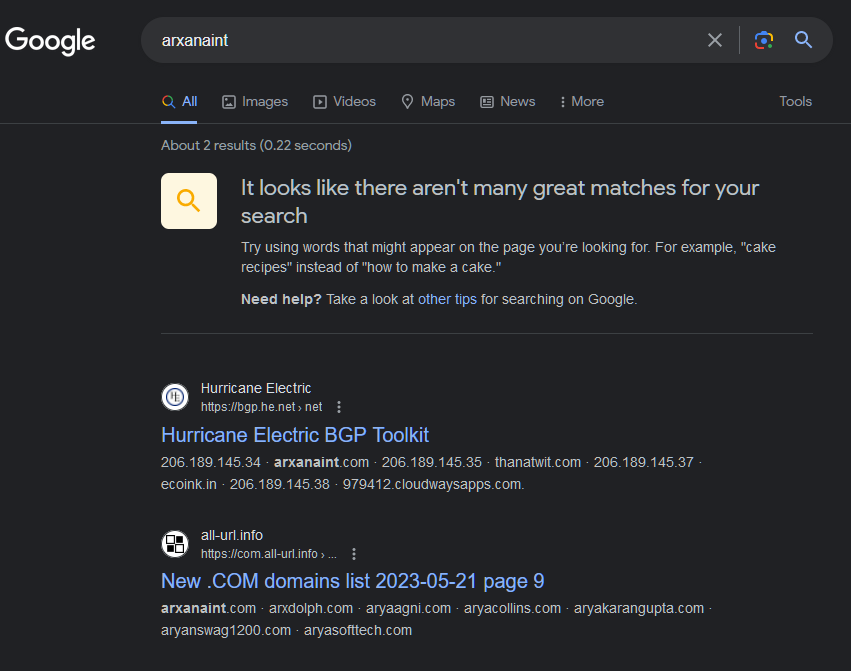Why personal webpage is such a rare occurance on Chinese Internet

So this is the first application of Umwelt: the context variables cannot be easily picked up by the current generation of large language models.
But first I have to be very clear: the recess of personal webpage is a global phenomena. It irrelevance can even be noticed by searching the domain of this webpage:

Well, hehe.
To perform some internet archeology, we need the tool from past:
root@DESKTOP-TLECVG4:~# whois arxanaint.com
Domain Name: ARXANAINT.COM
Registry Domain ID: 2782745192_DOMAIN_COM-VRSN
Registrar WHOIS Server: whois.google.com
Registrar URL: http://domains.google.com
Updated Date: 2023-05-26T15:09:35Z
Creation Date: 2023-05-21T02:25:05Z
Registry Expiry Date: 2024-05-21T02:25:05Z
Registrar: Google LLC
Registrar IANA ID: 895
Registrar Abuse Contact Email: registrar-abuse@google.com
Registrar Abuse Contact Phone: +1.8772376466
Domain Status: clientTransferProhibited https://icann.org/epp#clientTransferProhibited
Name Server: NS1.DIGITALOCEAN.COM
Name Server: NS2.DIGITALOCEAN.COM
Name Server: NS3.DIGITALOCEAN.COM
DNSSEC: unsigned
URL of the ICANN Whois Inaccuracy Complaint Form: https://www.icann.org/wicf/Well, so the symptom is worse than initial expected. I cannot even find a website registered on Google domains. So, why is this? Probably because most domain names are just lazing around after registration, or they're hanging out displaying all sorts of trashy content. So, the assumption you make about some no-name personal website is a bit like judging a shop by its dodgy storefront: you have no clue what's inside, but let's be honest, you can bet your bottom dollar there's nothing worth your time in that decrepit part of the internet.
Even so, personal websites in the English-speaking world are not so rare, after all, setting them up is not that difficult: you just need to register a domain name, buy a VPS, set up a standard "one-click configuration template" and it can be propped up. An Analog Intelligence like me, who has a rudimentary understanding of the Internet, can set it up by pulling an all nighter. But the difficulty faced by a Chinese is insurmountable, since we face the N+1 layer of the TCP/IP model: policy layer.
How much effort is required for compliance in China? Well, first compliance is not really the right word, since the rule is not written down, and one need to guess the feeling of the authority. To prevent it getting too dry, let's do a case study of (sgamer.com) It was once a gaming forum for Dota players; however, as the game is getting older, the forum's topic have shifted slightly. Then, at the begining of COVID-19 outbreak, this Wuhan-based forum somehow become a place where people express their resent. This got the administrators of the forum afraid of a potential crackdown. In order to ensure "nothing goes wrong", all posts and replies are required to be reviewed by an employee before they can be posted. This is the type of latency you get from RFC 1149
With this level of compliance effort required, it's essentially impossible to run a personal website legally in China. Meanwhile, mainstream platforms are allowed to host various user-generated contents and display them in real time. Look, there's even TikTok (of course, the Chinese domestic version). Publishing content on the Chinese internet is a privilege, as publishing has always been like that in China.
Nonetheless, this argument can't fully justify the decision to set up a website: There are many trustworthy and uncensored platforms outside the Great Firewall, like YouTube, GitHub, etc., where I could fully express these thoughts. Even within the Great Firewall, there are interesting platforms like shaoshupai (a Chinese platform that caters to niche interests and subcultures). Chances of having these meaningful interactions enabled by such communities is much greater than hosting a website.
Now it become clear that this is a personal decision with some perculiar background. Starting a personal website is like publishing academic papers, a pursuit where the return is disproportionate to the investment, something that requires faith to uphold. I happen to be someone who has experienced the process of scientific research publication. After several years, hundreds of thousands of dollars in investment, and publishing two papers, the readership is even less than a thousand. In this sense, academic papers and this website are similar: ostensibly written for dissemination, they are in fact a form of adherence to old formats of recording the status quo, and a hope vested in the future.
So, the purpose of this website becomes very clear. Some musings, which can't even satisfy the format of arXiv.org, are presented here through a self-funded publishing model, in a place unseen by others, as a tribute to the skeptical yet persistently hopeful version of myself. I hope I remember to renew the hosting, so that ten years from now I can still see who I was today.
